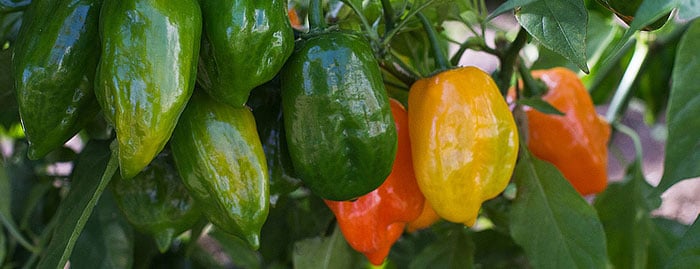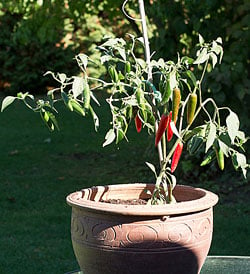Hot Peppers as Perennials? Sure!

As the gardening season comes to a close here in Vermont, some of us are just not taking it well. At all. I mean, how frustrating that our beautiful peppers are finally starting to ripen and short, cold days are just around the corner!
Peppers — just like tomatoes and eggplants — are perennial in hot zones. North of Zone 9, they’re treated as annuals. I have seen perennial tomatoes at the Edison and Ford Winter Estates in Fort Myers, FL, and also at Disney’s Epcot theme park. It’s pretty cool, they develop a thick, woody stem.
Luckily, I have two (real-life) friends in my Facebook gardening group who are experienced at overwintering peppers indoors. Before I share their secrets, let me mention why you might want to consider this approach:

- You're gardening in a short-season zone and would appreciate a head start on next year’s pepper crop. Both of my friends live at high elevations that experience earlier and later frosts than their neighbors. Planting young peppers each spring doesn’t always guarantee fruit.
- You’re addicted to specific cuisines. My friend Chad cooks amazing Asian food and he’s not about to give up his Thai Devil Peppers to some snow and darkness. Living on a secluded mountain means that there is no specialty food store nearby.
Marisa pots up her small, sweet peppers (they look like Lipstick or Apples to me) in two-gallon pots and brings them indoors before the first frost. She keeps grow lights on them for 18 hours a day and waters them sparingly. When it’s warm enough, she moves the plant — keeping it potted — outside for the summer. For Marisa, this practice gets her fruit in July. Without overwintering, she saw flowers but didn’t always get fruit.
Chad is more casual in that he doesn’t use lights. He also plants his Thai Bird peppers back into the garden come spring and digs them up in October. He noted that our friend Mike, an outstanding Thai chef, has kept a bird pepper alive for seven years and it stands 6 feet tall. Wow.
This year, count me in! I have a jungle of peppers to choose from. We all agreed that small peppers seem to work well and that if you live in a dark, arid cave (like me and Marisa,) you may need lights and perhaps a humidifier. Further, we all decided to try bigger peppers this year, just to find out if we were wrong about the size factor. I would love it if you would join us and report back with what you learn.
Print this Article:
Get the Dirt
Stay up to date on new articles and advice. Please fill out the information below.

